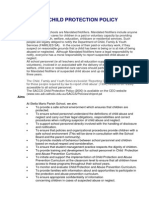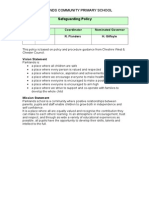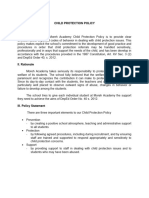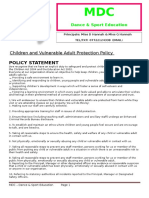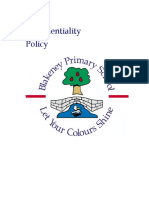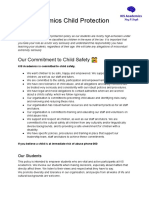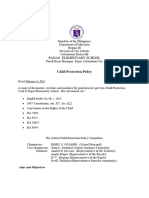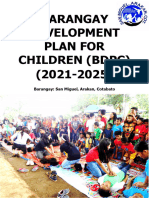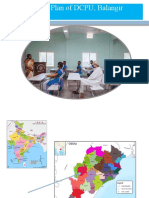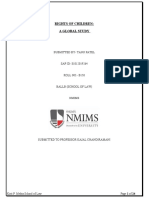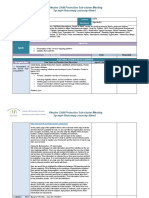Safeguarding Policy 2013
Safeguarding Policy 2013
Uploaded by
Alexandru ZahariaCopyright:
Available Formats
Safeguarding Policy 2013
Safeguarding Policy 2013
Uploaded by
Alexandru ZahariaOriginal Description:
Copyright
Available Formats
Share this document
Did you find this document useful?
Is this content inappropriate?
Copyright:
Available Formats
Safeguarding Policy 2013
Safeguarding Policy 2013
Uploaded by
Alexandru ZahariaCopyright:
Available Formats
Devonshire Infant School
SAFEGUARDING POLICY
Introduction
Devonshire Infant School fully recognises its responsibilities for child safeguarding. We
recognise that all children have a right to be protected from all forms of abuse, whether
physical, emotional, sexual or neglect, and every childs health, safety and well-being are our
prime concern. Our children have the right to protection, regardless of age, gender, race,
culture, religion or disability. They have a right to be safe in our school, and we also have a
role in helping to keep them safe elsewhere.
We work within the child protection guidelines issued by Portsmouth City Council and
Portsmouth Safeguarding Children Board. The school co-operates, liaises and initiates
contact with outside agencies when necessary, for the benefit of the child.
Our policy applies to all staff, governors and volunteers working in the school.
Aims and objectives
To ensure that we practice safe recruitment in checking the suitability of staff and
volunteers to work with children.
To raise awareness of child safeguarding issues and equip children with the skills
needed to keep them safe.
To develop and then implement procedures for identifying and reporting cases, or
suspected cases, of abuse.
To support pupils who have been abused or are at risk of abuse, in accordance with
their agreed child protection plan.
To develop effective working relationships with all other agencies involved in the
safeguarding of children.
To develop a structured procedure that will be followed by all members of the school
community in cases of suspected abuse.
We recognise that because of the day to day contact with children, school staff are well
placed to observe the outward signs of abuse. The school will therefore:
establish and maintain an environment where children feel secure, are encouraged to
talk, and are listened to;
ensure children know that there are adults in the school whom they can approach if
they are worried;
include opportunities in the PSHE curriculum for children to develop the skills they
need to recognise and stay safe from abuse.
School procedures
We follow the procedures set out by the Portsmouth Safeguarding Children Board and take
account of guidance issued by the Department for Education (DfE) to:
ensure we have a DOSC (designated officer for safeguarding children) who has
received appropriate training and support for this role. The DOSC at Devonshire is the
Headteacher, and training is updated every three years;
ensure we have a nominated governor responsible for child protection, who staff
would report to in the event of an accusation being made by a child concerning the
DOSC;
ensure every member of staff and governing body knows the name of the DOSC and
their role;
ensure all staff understand their responsibilities, in being alert to the signs of abuse
and responsibility for referring any concerns to the DOSC;
ensure there is whole school training regarding child safeguarding for all staff at least
every three years;
ensure that parents have an understanding of the responsibility placed on the school
and staff for child safeguarding by setting out its obligations in the school prospectus;
develop effective links with relevant agencies and co-operate as required with their
enquiries regarding child safeguarding matters including attendance at case
conferences;
co-operate with agencies that wish to interview a child in school without the consent
of the parents, if such interviews are considered to be in the best interests of the child;
have a member of staff present during any interview if the child wishes;
keep written records of concerns about children, even where there is no need to refer
the matter immediately;
ensure that staff complete the individual safeguarding chronology log with any
relevant information pertaining to individuals;
ensure that staff complete an incident log recording all communication with Social
Care and the Joint Action Team;
ensure all records are kept securely;
follow procedures where an allegation is made against a member of staff or volunteer;
ensure safe recruitment practices are always followed for all members of staff,
including volunteers.
We recognise that children who are abused or witness violence may find it difficult to
develop a sense of self worth. They may feel helplessness, humiliation and some sense of
blame. The school may be the only stable, secure and predictable element in the lives of
children at risk. When at school, their behaviour may be challenging and defiant or they may
be withdrawn. The school will endeavour to support the child through:
the school ethos which promotes a positive, supportive and secure environment and
gives pupils a sense of being valued;
the content of the curriculum;
the school behaviour policy which ensures that pupils know that some behaviour is
unacceptable but they are valued and not blamed for any abuse which has occurred;
liaison with other agencies that support the pupil, including: social care, CAMHS
(child and adult mental health service), MABSS (multi-agency behaviour support
service), JAT (joint action team) and education psychology service;
ensuring that, where a pupil on a child protection plan leaves, their information is
transferred to the new school immediately and that the childs social worker is
informed.
The Designated Officer for Safeguarding Children (DOSC) is responsible for:
Referring a child to Social Care if there are concerns about his/her welfare or there are
suspicions of possible abuse or neglect;
ensuring that detailed and accurate written records of concerns about a child are kept,
even if there is no need to make an immediate referral;
ensuring that all records are kept confidentially and securely in the head teachers
office, and are separate from other pupil records.
acting as a focal point for staff concerns, and liaising with other agencies and
professionals;
ensuring that either they or another appropriately informed member of staff attend
case conferences, family support meetings, core groups, or other multi-agency
planning meetings;
ensuring that all staff are aware of the schools safeguarding policy and procedures,
and know how to recognise and refer any concerns;
keeping themselves up to date with knowledge to enable them to fulfil their role,
including attending relevant training at least every three years.
Teaching & non-teaching staff
All members of staff refer any concerns they have about a child to the DOSC as soon
as possible.
All staff will:
listen to any disclosure made by a child, without questioning them, and keep
calm and offer reassurance;
accept what the child says without challenge;
not blame or criticise either the child or the perpetrator;
not promise confidentiality and explain that they may have to tell. If they do
need to tell somebody they will explain who will be told and why;
make notes at the time they observe any injury or mark, or a child makes a
disclosure, and complete an incident log form, including dates and times and
detailing the facts;
remember to keep notes factual and not make assumptions or interpret what
they have been told;
use the childs own language to quote rather than translating their comments;
be aware that these notes may be used at a later date to support a referral to an
external agency.
Confidentiality
We recognise that all matters relating to child protection are confidential. The DOSC or
inclusion manager will disclose personal information about a pupil to other members of staff
on a need to know basis only. All staff are aware that they have a professional responsibility
to share information with other agencies in order to safeguard children, and that they cannot
promise a child to keep secrets which might compromise the childs safety or well-being or
that of another.
Allegations against staff
All school staff should take care not to place themselves in a vulnerable position with a child.
It is always advisable for interviews or work with individual children or parents to be
conducted in view of other adults.
We understand that a pupil may make an allegation against a member of staff. If such an
allegation is made, the member of staff receiving the allegation will immediately inform the
Headteacher or the most senior teacher if the Headteacher is not present.
The Headteacher/senior teacher on all such occasions will discuss the content of the
allegation with the Local Authority Designated Officer (LADO).
If the allegation made to a member of staff concerns the Headteacher, the person receiving
the allegation will immediately inform the Chair of Governors who will consult with the
Local Authority, without notifying the Headteacher first.
The school will follow the Local Authority procedures for managing allegations against staff.
Suspension of the member of staff against whom an allegation has been made needs careful
consideration, and we will consult with the Local Authority in making this decision.
Other measures in school pertinent to safeguarding are:
The health, safety and welfare policy
The school has a health, safety and welfare policy, which is monitored regularly by the
governing body. Please refer to this policy for further information, including first aid, use of
medicines, internet safety and fire safety procedures.
Meeting the needs of pupils with medical conditions
At Devonshire we work closely with parents and our school nurse to ensure that the medical
needs of pupils are met. If necessary, a protocol is written with parents and the school nurse
to ensure that school is fully aware of the appropriate management of any known medical
condition. This protocol is shared with staff in school on a need to know basis.
Behaviour and physical intervention
We have a comprehensive behaviour management policy, including the use of physical
handling, which is reviewed regularly. Please refer to this policy for further information.
Site security
Please refer to our security policy for details about site security.
Attendance
Please refer to our attendance policy for further information.
Appointments of staff and induction
All staff that are appointed to work in school have a criminal records search carried out. This
search highlights people who have a criminal record or if previous allegations have been
made about them. If staff are found to have a criminal record the appointment is reconsidered
by the Headteacher and the Governing Body. The LA is informed directly by the Disclosure
and Barring Service. The HR department of the LA also automatically perform a list 99 check
for all new staff and report issues immediately to school.
The Headteacher sits on all appointment panels where the candidates are external applicants.
The Headteacher and Deputy headteacher have undertaken the LA training on Safer
Recruitment.
New staff are inducted into safeguarding practices. Newly appointed staff are assigned a
mentor for the induction period. It is the responsibility of the mentors to familiarise new staff
with procedures and policy, which affect the health and safety of all at school but especially
the children. New staff are also issued with a copy of the staff induction handbook.
Induction of volunteers
Regular volunteers also have Disclosure and Barring Service clearance. For a brief activity,
such as a school visit, which does not involve the supervision or close contact of children the
school will use discretion. For extended contact with children, when children may be left
alone with an adult, or when an adult visitor may be in and around the school building, a full
DBS search will be conducted. Visitors who do not yet have clearance will under no
circumstance be left alone with a child or group of children. The finance manager is
responsible for ensuring that all appropriate adults have DBS clearance. All volunteers are
also given a Volunteering at Devonshire Infant School leaflet, highlighting their
responsibilities regarding safeguarding children.
The design of the curriculum
The curriculum deals with safeguarding in two ways. Firstly, the curriculum in subjects such
as Personal, Social and Health Education discusses relevant issues with the children. Topics
include such themes as drugs, sex and relationships and stranger danger. Children are
encouraged to explore and discuss these issues.
Secondly, the curriculum is designed so that safety issues within the subject are discussed and
safe practices taught, such as using equipment properly in PE and design and technology. At
all times there has to be appropriate staffing levels and when the curriculum is taken out of
school appropriate and agreed pupil/adult ratios are maintained. The lead adult always
assesses visits as to the level of risk and all trips are finally authorised by the Headteacher.
Visiting speakers, with correct clearance are always welcome into school so that they can
give specialist knowledge to the children.
Equal opportunities
Devonshire has an equal opportunities policy. Please refer to it for further information.
Racial tolerance
Along with the equal opportunities policy there is also a Race Equality Policy. Please refer to
it for further information.
Photographing and videoing
There has been a lot of controversy about adults photographing and filming children.
The concerns are genuine; however our policy is to allow parents to photograph and video
their children during school events and performances. Children whose parents do not wish
them to be filmed or photographed will not participate in the event.
Educational visits
We have a separate policy for educational visits which is followed at all times by all members
of staff. Please refer to this policy for further information.
Whistleblowing
If members of staff ever have any concerns about the behaviour or intentions of any person
within the building, school grounds or within proximity of children, they have a professional
duty to inform the management accordingly. This can be done in writing or verbally but staff
should be prepared to discuss issues in the confidence that any such matter will be dealt with
sensitively and with the necessary degree of confidentiality. The school has a whistleblowing
policy which has been distributed to every member of staff. Please refer to it for further
detail.
Review
Reviewed and amended: May 2013
Ratified by Governors:
Next review: May 2014
Attachments: Appendix 1 Child protection procedure flow chart
2 Categories of abuse
You might also like
- Child Protection PolicyDocument36 pagesChild Protection PolicyRoy ReyesNo ratings yet
- Sample Child Protection Policy For Milagros HighDocument2 pagesSample Child Protection Policy For Milagros HighSalinasJay100% (4)
- Safeguarding Letter To ParentsDocument2 pagesSafeguarding Letter To ParentsstretfordhighNo ratings yet
- Child Fam AssessmentDocument280 pagesChild Fam AssessmentPuscasu Alexandru100% (1)
- Safeguarding PolicyDocument15 pagesSafeguarding PolicyathersleysouthNo ratings yet
- Child Protection PolicyDocument16 pagesChild Protection PolicykeiraNo ratings yet
- Child Protection PolicyDocument16 pagesChild Protection PolicymistermayohNo ratings yet
- Child Protection PolicyDocument17 pagesChild Protection PolicykeiraNo ratings yet
- Safeguarding Policy Sept 2016Document14 pagesSafeguarding Policy Sept 2016fionaphimisterNo ratings yet
- 2016 Whole School Child Protection Policy and Templates Revised Nov 2016Document82 pages2016 Whole School Child Protection Policy and Templates Revised Nov 2016northwheatleyNo ratings yet
- Safeguarding Policy Sept 2016Document11 pagesSafeguarding Policy Sept 2016fionaphimisterNo ratings yet
- Childprotection PolicyDocument8 pagesChildprotection PolicySamuel Kings SchoolNo ratings yet
- Child Protection PolicyDocument4 pagesChild Protection PolicybrendascobleNo ratings yet
- Child Protection and Safeguarding Policy March 2017Document23 pagesChild Protection and Safeguarding Policy March 2017nemigio dizonNo ratings yet
- Safeguarding Policy Knowing The Children - NEWDocument22 pagesSafeguarding Policy Knowing The Children - NEWkeiraNo ratings yet
- Child Protection Policy July 2012Document5 pagesChild Protection Policy July 2012fionaphimisterNo ratings yet
- NWPS Safeguarding Policy - Sept 2014Document32 pagesNWPS Safeguarding Policy - Sept 2014northwheatleyNo ratings yet
- Safeguarding 2016-17 PDFDocument25 pagesSafeguarding 2016-17 PDFkeiraNo ratings yet
- 01 ELIM (Childcare) Safeguarding Chidren & Child Protection Policy 2023.01Document17 pages01 ELIM (Childcare) Safeguarding Chidren & Child Protection Policy 2023.01Laura LauritaNo ratings yet
- Child Protection Policy 0911Document11 pagesChild Protection Policy 0911Kris HobsterNo ratings yet
- Safeguarding PolicyDocument14 pagesSafeguarding PolicyChrist's SchoolNo ratings yet
- CHILD PROTECTION POLICY - ST Dominics - Sixth Form CollegeDocument4 pagesCHILD PROTECTION POLICY - ST Dominics - Sixth Form CollegeTiago CruzNo ratings yet
- Safeguarding Children-Child ProtectionDocument5 pagesSafeguarding Children-Child ProtectionKingsland Pre-SchoolNo ratings yet
- Child ProtectionDocument4 pagesChild Protectionapi-292355491No ratings yet
- ILS Child PolicyDocument3 pagesILS Child Policyinternationallibertyschool2No ratings yet
- Child Protection and Safeguarding PolicyDocument7 pagesChild Protection and Safeguarding PolicyJoshua JamesNo ratings yet
- Safeguarding Policy Feb 13Document29 pagesSafeguarding Policy Feb 13parkadminNo ratings yet
- Moreh Child ProtectionDocument6 pagesMoreh Child ProtectionPamela GalveNo ratings yet
- Safe Guarding /child Protection PolicyDocument21 pagesSafe Guarding /child Protection PolicyKhalid KhanNo ratings yet
- Manahaw Elementary School Child Protection PolicyDocument3 pagesManahaw Elementary School Child Protection PolicyRenelyn Rodrigo SugarolNo ratings yet
- 2014-15 Child Protection QuestionnaireDocument5 pages2014-15 Child Protection Questionnairedanic ajane antolo100% (1)
- Mdc-Policies-Child ProtectionDocument7 pagesMdc-Policies-Child Protectionapi-325880402No ratings yet
- Child ProtectionDocument16 pagesChild ProtectionFingertipSolutionsNo ratings yet
- For The Purpose of This Policy, A Child Will Be Considered To Be A Person Under The Age of 18 YearsDocument10 pagesFor The Purpose of This Policy, A Child Will Be Considered To Be A Person Under The Age of 18 YearsSaeed MuhammadNo ratings yet
- Child Protection PolicyDocument3 pagesChild Protection Policyapi-270393900No ratings yet
- Child Protection PolicyDocument2 pagesChild Protection PolicydickovskiNo ratings yet
- Child Protection and Safeguarding Policy Oct 2021Document28 pagesChild Protection and Safeguarding Policy Oct 2021Helen EarlNo ratings yet
- Kiddies Lounge Policy 2018Document96 pagesKiddies Lounge Policy 2018api-1966213540% (1)
- Castledawson Primary School: Revised May 2019Document8 pagesCastledawson Primary School: Revised May 2019Brijesh SinghNo ratings yet
- SS Child Protection PolicyDocument16 pagesSS Child Protection Policyshimaa elzoghabieNo ratings yet
- Confidentiality PolicyDocument8 pagesConfidentiality PolicyNathalya SummerNo ratings yet
- EYE3SafeguardingChildren AssignmentDocument27 pagesEYE3SafeguardingChildren AssignmentIoana Laura LucaNo ratings yet
- Module 1 Child ProtectionDocument7 pagesModule 1 Child Protectionv.michaeljg1No ratings yet
- Module 5 - Good PracticeDocument6 pagesModule 5 - Good PracticeamiraadelkadousNo ratings yet
- Anti Bullying PolicyDocument5 pagesAnti Bullying PolicyCreative BlogsNo ratings yet
- KIS Academics Child Protection Policy - 18 - 05 - 2021Document7 pagesKIS Academics Child Protection Policy - 18 - 05 - 2021Sunny XiaNo ratings yet
- School Child Protection PolicyDocument5 pagesSchool Child Protection PolicyJaniel Garcia100% (1)
- British S Child Protection PolicyDocument13 pagesBritish S Child Protection PolicyRamy AhmedNo ratings yet
- CPIS Mod 1 PDFDocument6 pagesCPIS Mod 1 PDFAlice UwimanaNo ratings yet
- Child Protection PolicyDocument3 pagesChild Protection PolicystuandstaceNo ratings yet
- Child Protection PolicyDocument8 pagesChild Protection PolicyDarton CollegeNo ratings yet
- GEE Group 1 PresentationDocument18 pagesGEE Group 1 Presentationwongwingkiu.agnesNo ratings yet
- Child Protection Policy OrientationDocument11 pagesChild Protection Policy OrientationMarideeh G. Leganson100% (1)
- CPP DtmesDocument10 pagesCPP DtmesMAHATHMA DALANDASNo ratings yet
- Module 5 Child ProtectionDocument5 pagesModule 5 Child Protectionv.michaeljg1No ratings yet
- Child Protection and Safeguarding Policy V10 12.12.22-18558 - 20230126160532702Document39 pagesChild Protection and Safeguarding Policy V10 12.12.22-18558 - 20230126160532702Abbie StorerNo ratings yet
- Anti Bullying PolicyDocument6 pagesAnti Bullying PolicyDion Ralf M. CandelNo ratings yet
- Module 1Document7 pagesModule 1amiraadelkadousNo ratings yet
- Special Educational Needs in Practice (Revised Edition): A step-by-step guide to developing a SEN inclusion policy and delivering the requirements of Early Years Action PlusFrom EverandSpecial Educational Needs in Practice (Revised Edition): A step-by-step guide to developing a SEN inclusion policy and delivering the requirements of Early Years Action PlusNo ratings yet
- Meeting Special Needs: A practical guide to support children with Attention Deficit Hyperactivity Disorder (ADHD)From EverandMeeting Special Needs: A practical guide to support children with Attention Deficit Hyperactivity Disorder (ADHD)No ratings yet
- Steven Hoskin Practice ReviewDocument3 pagesSteven Hoskin Practice Reviewsimiyon simiNo ratings yet
- Addressing The Impact of Foster Care On Biological Children and Their FamiliesDocument21 pagesAddressing The Impact of Foster Care On Biological Children and Their Familiesapi-274766448No ratings yet
- Report of Child Protection and LegislationDocument14 pagesReport of Child Protection and LegislationInstant Assignment HelpNo ratings yet
- Example of Literature Review On Domestic ViolenceDocument10 pagesExample of Literature Review On Domestic Violencec5qd4nn8No ratings yet
- Narrative Child Protection InsetDocument2 pagesNarrative Child Protection InsetMarina BragadoNo ratings yet
- Notice of Child AbuseDocument37 pagesNotice of Child AbuseFoliticNo ratings yet
- BDPC 2021-2025, San MiguelDocument18 pagesBDPC 2021-2025, San MiguelRon Robin100% (1)
- Child Protection PolicyDocument12 pagesChild Protection PolicyMohamedi MirajiNo ratings yet
- Template 4 DAP - BalangirDocument34 pagesTemplate 4 DAP - BalangirNandi Kishor SandhNo ratings yet
- ADEC - Al Manahil Private School 2016-2017Document22 pagesADEC - Al Manahil Private School 2016-2017Edarabia.comNo ratings yet
- Children in Foster Care: A Vulnerable Population at Risk: Delilah Bruskas, RN, MNDocument8 pagesChildren in Foster Care: A Vulnerable Population at Risk: Delilah Bruskas, RN, MNMohamed AbdulqadirNo ratings yet
- O Sanders, Higgins Prinz (2018)Document9 pagesO Sanders, Higgins Prinz (2018)Ign EcheverríaNo ratings yet
- International Safeguards For Children in Sport ENDocument19 pagesInternational Safeguards For Children in Sport ENPao MejiaNo ratings yet
- Office of The Sangguniang BarangayDocument20 pagesOffice of The Sangguniang BarangayJay ann AlpaparaNo ratings yet
- Tanu Patel Sioco RPDocument24 pagesTanu Patel Sioco RPTanu PatelNo ratings yet
- Deped Memo Webinars Course 2Document14 pagesDeped Memo Webinars Course 2Jeffrey Nabo LozadaNo ratings yet
- Chapter 1-fDocument34 pagesChapter 1-fkartik kasniaNo ratings yet
- House Rules & Procedures: Direct Provision Reception and Accommodation CentresDocument42 pagesHouse Rules & Procedures: Direct Provision Reception and Accommodation Centresapi-249115191No ratings yet
- What Reforms Can Be Made in The Juvenile Justice System in IndiaDocument3 pagesWhat Reforms Can Be Made in The Juvenile Justice System in IndiaPratham SaxenaNo ratings yet
- 24june2022 Eng CP Subcluster Ukraine MomDocument6 pages24june2022 Eng CP Subcluster Ukraine MomUn fachero InvisibleNo ratings yet
- Job Advert KG PrincipalDocument2 pagesJob Advert KG PrincipalAMAANO DOSNo ratings yet
- Licensing Rules FOR Child Care CentersDocument52 pagesLicensing Rules FOR Child Care CentersXjxjjdNo ratings yet
- Victims and Witnesses SummaryDocument16 pagesVictims and Witnesses SummaryHansin KapoorNo ratings yet
- Addressing The Complexity of Violence Against Women in Sport - Using The World Café Method To Inform Organizational ResponseDocument30 pagesAddressing The Complexity of Violence Against Women in Sport - Using The World Café Method To Inform Organizational Responsegkrz4f8cjcNo ratings yet
- Wfis P o R 1.editionDocument34 pagesWfis P o R 1.editiongerarmart50% (2)
- House Hearing, 107TH Congress - Capta: Successes and Failures at Preventing Child Abuse and NeglectDocument201 pagesHouse Hearing, 107TH Congress - Capta: Successes and Failures at Preventing Child Abuse and NeglectScribd Government DocsNo ratings yet
- The Children Act 1989 Guidance and RegulationDocument186 pagesThe Children Act 1989 Guidance and RegulationkvisaNo ratings yet
- DCPCR2020Document1 pageDCPCR2020Devesh KumarNo ratings yet
- Advertisement For Vacant Position in CCL NLSIU: Job PostingDocument3 pagesAdvertisement For Vacant Position in CCL NLSIU: Job PostingBar & BenchNo ratings yet























